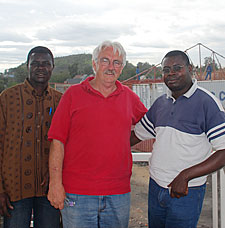Sydney Anglican Col Peet is wrestling with feelings of sadness, anger and frustration after he and other Christian workers were forced to evacuate the Democratic Republic of Congo last week.
Since his arrival home on Friday morning, Mr Peet, a friend of All Souls Leichhardt, has had a flurry of media engagements " including ABC Radio and ABC TV " as well as attending three church services including Penshurst Anglican, and praying with his former rector, the Rev Dr Tim Foster.
 Yet the weight of concern for those he has left behind at the HEAL Africa hospital in the troubled town of Goma remains.
Yet the weight of concern for those he has left behind at the HEAL Africa hospital in the troubled town of Goma remains.
"It's really difficult," says Mr Peet, pictured here with his building supervisor and assistant.
"I had enough money to get somewhere to sleep if I was stuck somewhere for a week or a few days, and I gave the rest of my money to my staff, they bought enough food to blockade themselves and their families for two weeks and leave, and I couldn't contact them again."
Mr Peet had been installing equipment for saving and capturing water in buildings at HEAL Africa, the hospital made famous by the Lumo documentary, which was shown around Australia earlier this year.
As the rebel forces loyal to General Laurent Nkunda and the Congolese army have clashed in recent days, 250,000 people have been forced to leave their homes.
Mr Peet says he has seen “terrible atrocities” inflicted even on innocent children, as Congolese soldiers have been trying to extort money and cars in order to flee from the rebels.
“The UN has a large force in Goma but not large enough to hold back the rebel forces or keep the Congolese army soldiers under control,” he explains.
Building one day, leaving the next
As rebels advanced on Monday last week and the general population protested against UN forces in indignation "that the UN didn't appear to be doing anything", Mr Peet says he was smuggled back to the guesthouse where he was staying and told to be ready to leave the country quickly overnight.
A meeting between the United Nations Security Council and non-government organisation representatives the next morning confirmed that Mr Peet and some of his fellow volunteers would have to make their way out of the Congo quickly.
"White people are real targets, if there's a hostage crisis, we're it," he explains.
"We had a fairly long prayer session with our people " it was very sad to see all the African men crying " and me!" he exclaims.
"We didn't want to go, we just didn't want to leave them, but we knew we were causing them more danger by staying so we had to go."
With plane tickets booked for flights weeks away, and no visa to enter Rwanda, the trip to Kigali took many hours he says.
"It was very busy. There was a lot of prayer. Every NGO was just clearing, a couple of hundred of us got out."
Having left Rwanda on Wednesday afternoon, Mr Peet flew first to Nairobi, then to Bangkok and Hong Kong, before finally touching down in Sydney on Friday morning.
While he is enjoying the home comforts, he is eager to hear news of his Congolese colleagues, whom he says were able to go to church on Sunday, and are carrying out emergency operations at the hospital, waiting to see what will come of the peace talks that continue.
In a letter to Prime Minister Kevin Rudd, Mr Peet has expressed his desire to return to Goma to finish the work he started on the seven hospital buildings, two of which he had already finished.
“I intend returning to complete the work I have started, when the situation becomes stable, to show the local population that Aussies do care for them and are willing to help,” he has written.
HEAL Africa is a hospital specialising in fistula surgery, offering healing to the tens of thousands of Congolese women who have horrific injuries after being brutally raped, many by Rwandan rebel militia.
In recent days, the hospital has reportedly been treating a number of casualties from the fighting, including civilians, Congolese soldiers, and rebels.






















